Australia’s podcasting boom has finally arrived
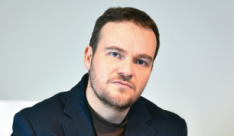 With print publishers racing to get on board, consumers back in love and brands recognising it as the next frontier of native advertising, podcasting is the medium of 2015, argues Mumbrella’s Tim Burrowes.
With print publishers racing to get on board, consumers back in love and brands recognising it as the next frontier of native advertising, podcasting is the medium of 2015, argues Mumbrella’s Tim Burrowes.
Back in 2012 I found myself at a gathering of a cult.
I joined hundreds of disciples gathered at Sydney’s Town Hall to worship at the feet of Ira Glass. Tickets to hear from the host of This American Life were so in demand that they put on a second late show.
With just an iPad in his hand to play audio clips and control a music bed as he talked, the presenter of This American Life gripped the room.
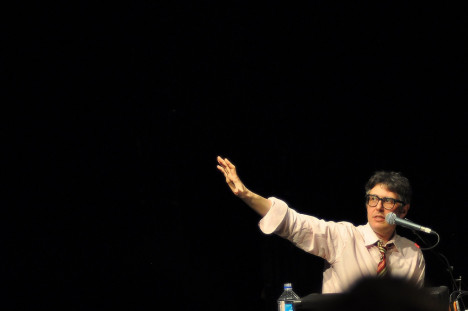
This American Life’s Ira Glass (Picture by Ricky Montalvo, shared under Creative Commons)
And I realised that the exclusive club of This American Life podcast listeners in Australia was a bit bigger than I’d thought.
Really, I should have known. When ABC Radio National picked it up for rebroadcast in 2011, the response on our comment thread was ecstatic. And it actually gets nearly a million downloads an episode from around the world.
If I were to make a list of things I love most, listening to podcasts would be up there. And This American Life was the gateway drug. Week after week, the quality of the storytelling and level of production moves, entertains and informs me. It’s usually uploaded in time to fall asleep to on a Monday night, Australian time.
Whether trying to fall asleep, pass time on a long run or commute, podcasts are the bomb.
And yet, it also feels like the last medium that is also a bit of a club.
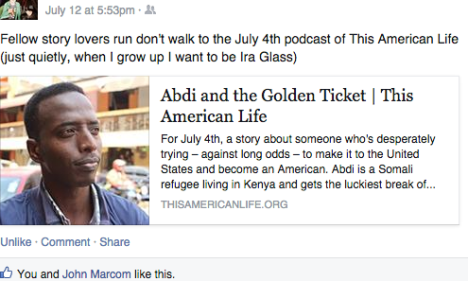 When a friend on Facebook shares a reference to a podcast you love, there’s a feeling of affirmation you don’t get by talking about Masterchef around the metaphorical watercooler.
When a friend on Facebook shares a reference to a podcast you love, there’s a feeling of affirmation you don’t get by talking about Masterchef around the metaphorical watercooler.
And a recommendation from a friend of a new podcast to listen to is gold.
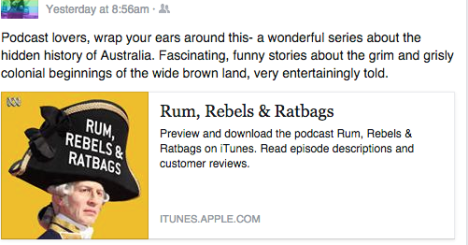
None of which is new of course. But it does feel as if we’re hitting some sort of tipping point where podcasting went out of fashion for a while – but it now heading towards the mainstream. And we’re also seeing a shift from radio shows also going out as podcasts, to podcast-first productions.
A few days ago I sat in X Studio in Kings Cross as Mark Bouris – who you’ll probably know as the boss from Celebrity Apprentice and owner of Yellow Brick Road – recorded his own podcast.
He started it a few weeks ago. Not long ago it was number six in the iTunes chart of top business podcast listening in Australia.
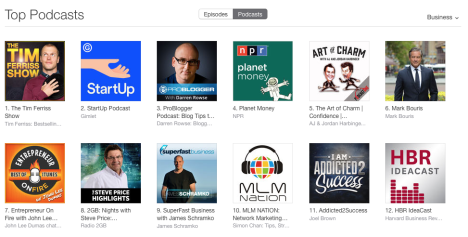
Bouris’s manager Nick Fordham tells me that the podcast is delivering about 100,000 downloads per episode, and has already delivered a total of half a million downloads.
Although the show has a sponsor in Audible (Amazon’s talking books product), that doesn’t appear to be the main motivation in doing it.
Clearly it offers an opportunity of shaping his own personal brand.
During the recording I attended, Bouris was kicking off his alternative to Shark Tank – positioning himself as a nurturing mentor, supporting entrepreneurs rather than taking the combative approach of the investors on the Channel Ten show.
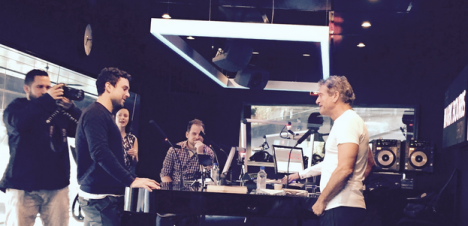
Cricketer Ed Cowan pitches his business idea to Bouris while Fordham looks on
What’s also interesting about the above chart of top business shows for Australia is that two of the three locally made shows are independent productions.
As I say, Bouris records his at X Studio with his agent Nick Fordham overseeing production.
And another high flyer in that chart is an Aussie indie – Darren Rowse, the Melbourne-based creator of the Problogger website.
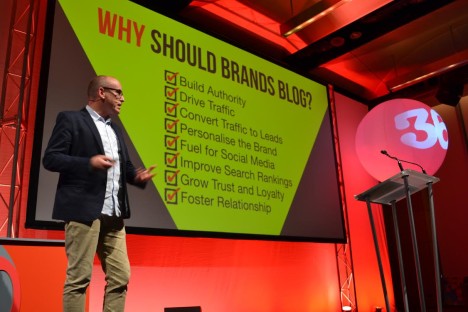
Blogger Darren Rowse – now a podcaster too
Rowse launched his podcast just a few weeks ago, and quickly became one of the most listened to business podcasts.
It extends his existing position as an authority on blogging and offers a daily tip on strategies to build audience and monetise blogs. He also upsells additional educational resources.
When I last looked, the only traditional media company to have a podcast in the business top ten is 2GB’s Steve Price. (ABC and Alan Kohler, where are you?)
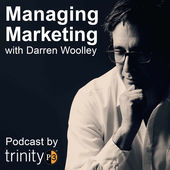 And also joining the fray in the last few weeks is Trinity P3 boss Darren Woolley with his own podcast with episodes aimed at marketers trying to better manage their agency relationships. You can hear Mumbrella’s deputy editor Nic Christensen share his tips on engaging with the trade press here.
And also joining the fray in the last few weeks is Trinity P3 boss Darren Woolley with his own podcast with episodes aimed at marketers trying to better manage their agency relationships. You can hear Mumbrella’s deputy editor Nic Christensen share his tips on engaging with the trade press here.
But the second coming goes further than that. The godfather of Australian podcasting is arguably Cameron Reilly, whose G’Day World which began in 2004 was thought to be the first Australian produced podcast.
Reilly created The Podcast Network which at its height produced 100 shows and had a global monthly audience of half a million before being crippled by the GFC in 2009 and closing in 2012.
But recent months have seen TPN reborn, thanks to the success of Reilly’s Life Of Caesar history podcast.
Indeed, one of the attractions of podcasting is the ability of independent voices to insert themselves into the agenda. NRL fan podcast Sharkcast, presented by two Cronulla fans, recently led the mainstream media when they interviewed the club’s coach Shane Flanagan and he said a little too much about the future of player Paul Gallen.
Similarly, I’ve been a long time fan of satirical podcast The Bugle, presented by John Oliver and Andy Zaltzman. Oliver visited Australia to film a segment for Jon Stewart’s The Daily Show. In the podcast, he described Australia as one of the world’s “most comfortably racist places” he had visited. I wrote a news story about his comments, and it was picked up across the world and became our most read story of 2013.
Which isn’t to suggest that an obvious business model is always there.
We used to do a weekly podcast ourselves. But our sales team struggled to monetise it. That harder-to-communicate metric of engagement – the willingness of a comparatively small number of people to commit up to an hour to listening – versus the high reach of the website meant that display ads were always easier products to sell.
For a while Southern Cross Austereo was a sponsor, but in the main, we did it because we loved doing it, and it gave us a reason to talk to some really interesting guests.
It was time consuming, but was my favourite part of the week. I’ve never really stopped thinking about bringing it back.
This monetisation issue is not uncommon.
I’m delighted that Hamish and Andy’s drivetime show is back. They’re some of the funniest, most talented broadcasters that Australia has ever produced.
But I’m still at my desk when the show airs. Happily there is a podcast. Having retained the digital rights to their show whose on air sponsor was Woolworths, it took a while for them to get a sponsor, but now have HTC.
Arguably, podcasts became fashionable when last year’s This American Life spin-off Serial became a bit of a hipster sensation when it reinvestigated an old court case and explored whether a young man had been wrongly committed of murder.
Even adland is piling in. You know a medium is having a moment when you start stumbling upon agencies crowbarring podcasts into their awards entry case studies, like GPY&Rs Letters of Gallipolli.
Podcasting is a great medium for native advertising. Macquarie Radio Network has cottoned on. In June it created The Road Next Travelled for Colonial Real Estate. It featured Ray Martin talking about retirement.
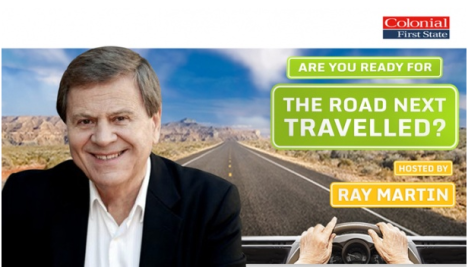
MRN’s podcast for Colonial First State
But more so than brands, podcasting is sweeping Australia’s non broadcast newsrooms. Like The Daily Telegraph’s Teletalk, which sees the Sydney newspaper’s columnists and journos take a tilt at talk radio. They’re currently posting four or five audio pieces a day.
Most ambitious from the Tele stable has been The Alibi, the Sunday Tele’s reinvestigation of two Sydney murders. The inspiration of Serial is overt – the series is named after the first episode of Serial, which was also called The Alibi.
But what impressed me about The Alibi is that the ambitions were towards radio levels of production, editing and music.
And the Sydney Morning Herald is also getting in on the action. It launched its Science Is Golden podcast, presented by science editor Nicky Phillips, in August.
A big question is whether university journalism courses are yet teaching the skills needed to deliver a good podcast. Certainly, the argument that they should be teaching podcasting skills is beginning to take off in the US. I understand that in Australia, Melbourne’s La Trobe University is about to launch a new second year subject for media and journalism student that will focus on podcasting
Consumer expectations have also caught up with one of the biggest attractions of podcasting. Podcasting is to radio as streaming is to television. In the same way that Netflix and other streaming services are teaching consumers to watch what they want ,when they want, podcasts have always had the same advantage over radio.
Of course, that on-demand expectation can be complementary, and extend a show’s reach. I have absolutely no idea when ABC Radio National’s Media report goes out (Thursday? Friday?), but I do know that it’s waiting for me in my iPhone by the time Saturday morning comes when I want to hear it.
Speaking of media, I’m a huge fan of James Manning’s Media Week podcast. His persistence with a recalcitrant Peter Meakin, then Seven’s news and current affairs boss, remains for me one of the best examples I’ve heard of a journo getting an interviewee to open up just by sticking with it. It went from Meakin blocking and parrying to one of the most entertaining interviews I’ve heard him give.
Right now, it feels like exciting news is coming every day of new developments in podcasting.
Earlier this week, Andrew Denton, one of Australia’s smartest broadcasting minds, told Junkee that he has been travelling the world creating a podcast series about euthanasia.
“I’ve also been keeping my brain busy and have spent most of this year quietly working on a podcast series about euthanasia, for which I’ve travelled around Australia, and to Belgium, The Netherlands and Oregon (three places where euthanasia, or assisted dying, is legal) and spoken to upwards of 100 different people on all sides of the argument. It’s been intense and very challenging and the edit lies ahead (cue panic). Expect to see it somewhere online in November.”
I can’t wait to hear it.
I think it may be time to put my money where my mouth is, and get back in the podcasting game myself. So I’m going to be brushing up on my skills. I see The Guardian’s organising a podcasting masterclass next month. I’ve bought my ticket.
Right now, anybody who is in journalism, or indeed anywhere in the business of helping brands talk to consumers, needs a sensible answer to the question: “Shouldn’t we be doing a podcast?”
- Tim Burrowes is Mumbrella’s content director. He used to present The Mumbrellacast. Maybe he will again.



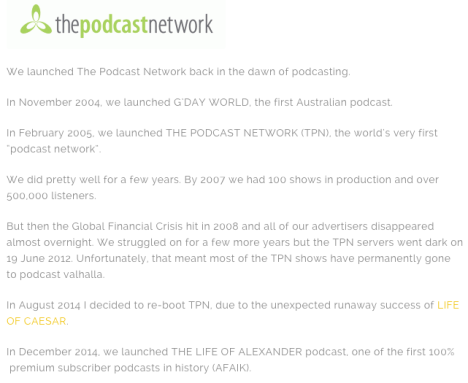
 Linkedin
Linkedin
TPN didn’t die due to the GFC FYI and the source: I’m a former TPN podcaster.
User ID not verified.
Hi Duncan,
That assertion was based on a page on the history of TPN: http://thepodcastnetwork.com/?page_id=4674
“But then the Global Financial Crisis hit in 2008 and all of our advertisers disappeared almost overnight. We struggled on for a few more years but the TPN servers went dark on 19 June 2012.”
Cheers,
Tim – Mumbrella
The Slate Culture Gabfest is almost always worth a listen. The Moth is pretty good as well. Monocle magazine have some good podcasts.
User ID not verified.
There’s some amazing work being done in this space by some really bright media minds.
Giant Dwarf (The Chaser’s Theatre) do a great short-form story-telling one called “Story Club”.
I’m working at Omny, we built Omny Studio here in Australia and we’ve been talking to people who want to be a part of this audio renaissance. The monetisation piece is not as difficult as it seems. There’s some great ideas coming through – watch this space.
User ID not verified.
Hi Tim,
An interesting article.
We began podcasts last year. Since then, the Mamamia Women’s Network has build a podcast network of five shows, all of which at some stage in their life cycle have been featured in itunes. We feature women, and a lot of them. From sociologist Susan Carland, to Dr Rebecca Huntley, former ABC presenter Sarah MacDonald, Mia Freedman and Jamila Rizvi, we cover everything from pop-culture to politics, to parenting.
Our flagship program, Mamamia Out Loud, has just eclipsed half a million downloads, and we’ve just partnered with Virgin Airlines to broadcast another one of our programs on their inflight entertainment systems.
For us, podcasting is a way to get more women’s voices on air, in primary roles, since commercial talkback radio seems so averse to it.
I’d be happy to talk to you anytime about podcasting in general.
Best regards,
Monique Bowley, Podcast Director, Mamamia Women’s Network
User ID not verified.
Hat tip to Andrew Sidwell. Aside from being a great guy he’s the brains behind Ray Martin for Collonial First State at Fairfax Radio.
User ID not verified.
Interesting, but no mention of the huge movements (in investment/revenue, company formation and talent poaching) happening particularly in East Coast USA? Serial, sure; but in its way, Serial is analogous to the lucky surfer riding a particularly favourable wave. Skill and expertise respected, but the wave was there too.
While it’s not really on the advertising/native/business side of things so much as the journalistic/storytelling one (though it touches on many aspects outside of the blogger-inspired, content marketing focussed approach – including the long-booming comedy podcast scene) … you can’t really can’t go past Nicholas Quah’s Hot Pod tinyletter and the (now-associated) Nieman Lab blog for real gutsy knowledge about this stuff.
User ID not verified.
Podcasting is now so popular We’ve started a business around it. Recorded and produced in a radio studio with an audio engineer, businesses can now have a professional sound fully produced and up on their own website for social media and marketing purposes.
User ID not verified.
2GB has been podcasting its shows since early 2006. In the early days the download numbers ranged anywhere from 100k-200k per month. Now in 2015, 2GB regularly passes 4 million downloads per month, the strongest being Ray Hadley and Steve Price.
The most exciting development for MRN is our new content like The Road Next Travelled and 60 Second Mentor.
User ID not verified.
Ugh. This is tired, uninspired commentary about the shittest aspects of a medium that is so multifaceted and fascinating. Typical of Mumbrella to have a million dumb comments about branded content and dickheads trumpeting that they were there first or something. So what if you’ve been podcasting shows? You don’t deserve awards for copying and pasting between formats. The best thing about podcasts is the creativity they can serve to a distributed niche, not the potential for any brand to now have professional sounding studios and staff dedicated to pumping out brand-friendly content to idiots/nobody.
If you think this type of shit has a single thing to do with the likes of Serial, you’re out of your fucking mind. But chances are you’re a dull ol’ dinosaur if you think this reading of podcasting holds any value anyway. Believe the hype if you want, what do I care?
User ID not verified.
Seriously, this is your article about podcasts? Almost as bad as Mamamia’s Ten Podcasts We Think You Should Listen To If You Liked Serial Because We Are Slightly Ahead Of You Vis A Vis ‘The Curve’.
User ID not verified.
Tim, you forgot:
http://www.theguardian.com/foo.....eafootball
This is the most popular podcast for Australian media buyers.
User ID not verified.
Australia’s own “Can’t Bowl Can’t Throw” is the world’s #1 cricket podcast.
User ID not verified.
I listen to the Bouris podcast. It’s good.
User ID not verified.
Cue announcement of Mumbrella partnering with one of the aforementioned brands to create a subscription model & branded content advertising options, which would make for a pleasant change than the usual ho hum…!
User ID not verified.
Great read and very true.
We’ve seen huge growth on our audioBoom platform here in Australia and NZ from not just major sporting teams, politicians, entertainers and radio stations but from teachers, small businesses and podcasters big and small who all see the benefits of audio in engaging with their fans. Time spent listening and user growth is rising and along with the multi-tasking benefit of podcasts, the opportunities for revenue growth are already present. We’re already monetising our content partners audio on our platform in a variety of ways as well. The most exciting thing is the massive range of quality podcast content now out there that listeners can binge on their mobile devices from professional audio producers to bedroom podcasters who are also creating exceptional shows. It’s an exciting time.
User ID not verified.
Has anyone noticed Australia’s owqn ABC RN has been podcasting for 10 years now? It’s not just a host for This American Life you know.
Everything from science guru Robyn Williams weekly travels around the science world, to the daily conversations of Life Matters, to the built radio documentary/podcasts of Background Briefing (investigative documentary) to 360documentaries, Earshot, Into the Music, and Hindsight. Off Track is a relative newcomer (environmental, but so much more) and is fantastic. Any health issue you care to worry about is podcast about by Dr Norman Swann on the Health Report. Then there’s Big Ideas, the Philosophers Zone… it’s a rich world out there.
Get with the RN program – most of their back catalogue is available online… you could die in 50 years and still not have heard everything they have to offer.
abc.net.au/rn
User ID not verified.
@Nick Meredith ignored because how can brands cash in?
User ID not verified.
I’ve been a listener to various Podcasts since the Pod (iPod!) brought them to our ears.
I think this resurgence is a trend.
‘On demand infotainment’ is not going away fast.
ROI will be tricky too establish.
That said, monetising it can only be done if and when reliable measurement of audience is available. A ‘Publisher statement’ of number of downloads is not going to cut it.
(I’m not aware of an independently verifiable report).
So quality of production, nature of content and (temporary) ‘category’ position on iTunes are all we have to value media value.
Listen to the intro to Tim Ferris’ Podcast to hear how he ‘manages’ integrating (fastforwadable) sponsor messages for example.
User ID not verified.
If any one is interested, the Festival of Dangerous Ideas is available for free through iTunes. ~24 hours of free provocative content.
Re podcast measurement: its linearly distributed to the ID of the platform, so its conceivably measurable but not necessarily a commercial priority for the app stores.
User ID not verified.
Don’t forget Australia’s first VODcast hosted by yours truly for the Collingwood Football Club back in 2005 – “The Weekend That Was”. http://www.collingwoodfc.com.a.....d-that-was
User ID not verified.
I am very, very proud to have been at ABC Radio National to help launch podcasting in 2005.
User ID not verified.